- DGK Viper 8.125 Deck Review: An Overall Good Board - April 20, 2022
- Best Skateboard Bearings Guide: All You Need Consider - January 27, 2022
- Most Famous Old School Skateboarders - January 27, 2022
Already you may have scoffed at the title if you happen to know me. At the time of writing, I am only a 25-year-old man. However, I’m going to state my case on why I’m qualified to write this guide.
You see, like many other older skaters out there, I picked up the sport over the lockdown period and began working tirelessly to become competent on a board after over ten years away from the sport. So I know what it is like to have the eyes of younger skaters on you as you relearn how to ollie.
It’s a strange and vulnerable time for older skaters and one that can be rather difficult to navigate. Not only because skating is a tricky sport to get good at and the perception will be that if you are older, but you must also be good.
It’s also difficult to navigate because being older brings with it fitness and health concerns, the real-world responsibilities of being an adult and for many, the pressure of finding a community of skaters that will accept you. As we said, it’s tricky but this guide is our way of helping you start strong on your belated skating journey.
In this guide, we take a look at the pros and cons of being an older skater, look at some of the best ways to navigate these potential pitfalls and we also look at some examples of famous skaters that got into the sport later than you might think. Here is our guide to skating at the age of thirty and over.
Why Is It Good to Start Skating Later in Life?
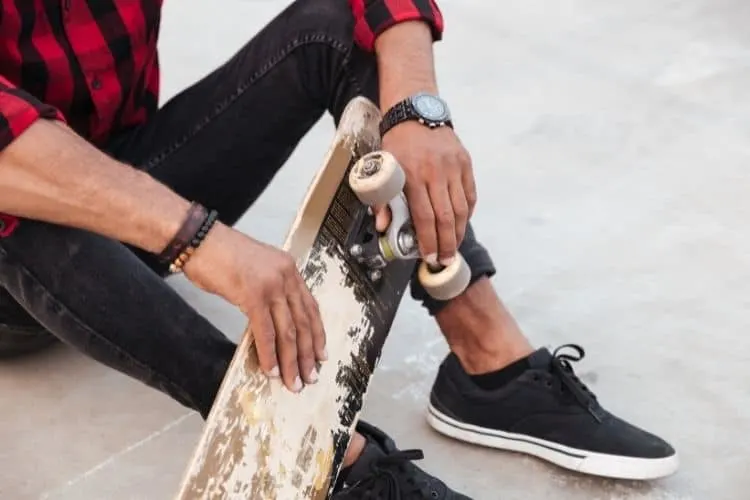
The benefits to starting skating are plentiful and while we could give you an abundance of entries that would work across the board regardless of age.
We want to focus on what makes skating in your thirties great when compared to when you are a kid. Take a look at this list and hopefully, this will help you understand just how good older skaters have it.
More Money, Less Problems
One of the best things about skating at this age, is that you will have more money than you would have if you were skating as a kid. An adult can buy a few boards on a whim if they like, they can replace broken gear or old bearings without any real stress or hassle.
In short, skating as an adult allows you to have better gear more regularly, allows you to pay your way into private parks if you need to and allows you to give yourself a better starting point for your skating career.
A Means of Making New Friends
If you are an adult reading this article, then you will likely know that making new, long-lasting friendships at this age is a challenge. There are fewer opportunities to naturally and regularly interact with others. Well, skating is the antidote for this.
Skating will allow you to connect with like-minded individuals that enjoy what you enjoy. You’ll be able to arrange trips to parks, learn from each other and with any luck, you’ll make lifelong friends that extend out of the context of skating.
A Way To Exercise in a Stress-Free Environment
As an adult, it can be tricky to carve out time to exercise and when we do, it tends to have to be in a very particular setting. You go to a gym, you go play an organised sport or you go for a run if that’s your thing. However, doing this often requires a membership, travel and for some, makes them feel on show to the world.
Well, with skating, all you need is a board, some smooth pavement and maybe some earbuds to pump some tunes. If you have that, you can exercise, stay fit and do so in one of the most chill and cathartic ways possible.
The Community is Very Supportive
There may be a perception from the outside looking in that as a beginner, there is a certain level of judgement from skaters looking on. However, at least in my experience, that couldn’t be further from the case.
When I have encountered skaters, both young and old, they have always assisted in any way they could, encouraged me when things became tough and when things went well, they would be the first to cheer and commend you for your efforts.
The skating community is one of the most wholesome and accepting of all sports, so you have nothing to fear when starting out.
Much More Accessible
If you are beginning your skating career now as opposed to say fifteen years ago, you’ll notice that skating is a much more accessible sport.
No matter where you are, we can guarantee that there are more parks around than there were back then, the gear is much better and conducive with an easier skating experience and there is an abundance of skating content and tutorials on the web that make learning new things as easy as a Google search (and some practice). So arguably, this is a better time than then to become a skater.
Then with regards to your own personal situation. Being an adult allows you to drive to locations that you might not have had access to before. So you’ll also be able to use the best facilities in your area as well.
An Adult Attitude Toward Skating
Then lastly, we have your attitude as an adult. I’m sure the younger readers will forgive me for saying, most teenagers and young adults can’t commit wholeheartedly to something. As teens, you are still learning who you are and when something new and interesting comes along, another is often cast to the side.
However, as an adult, you make a much more conscious decision to donate your free time and attention to skating, and therefore, when you are skating you are more likely to give it your all and will be extra motivated to succeed and progress.
What Are the Problems That Come with Skating in Your Thirties?
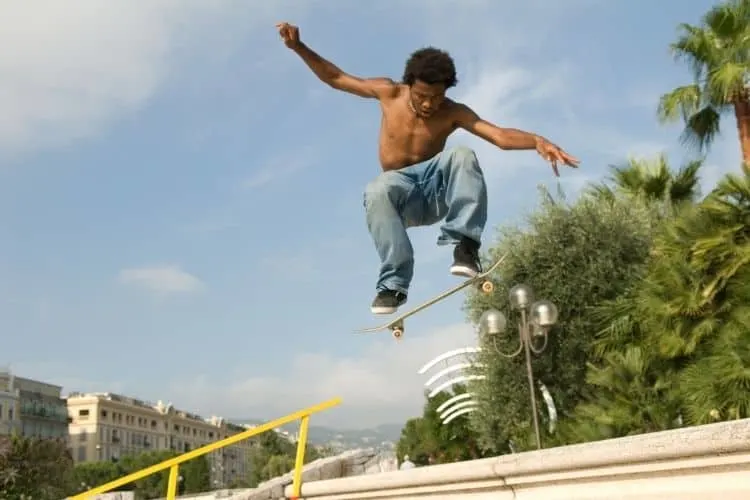
While we would never deter an older guy or gal from picking up skateboarding, there are some things that you need to be aware of. Skating in your thirties is very different from skating in your teens.
There are more variables in place, more harsh realities and more considerations that you will have to make just to hit the park for a few hours. So here is a list of some of the things you should at least be aware of before pick up or return to this sport:
Aches and Pains
The one that we would argue is the biggest hurdle to clear as an older skater is the aches, pains and the fact that you are much more susceptible to wear and tear.
As older skaters, our body demands more recovery time, often takes longer to heal after a heavy bail and we often get tired much faster than a young ball of energy at the skate park. However, this doesn’t mean that we cannot skate and do it regularly, we just have to be much smarter with your approach.
If you want to keep shredding on the regular, you will need to warm up before sessions. You will need to respect your injuries and rest adequately so that you don’t prolong your time out of action and you’ll need to take regular breaks during sessions so that you can ultimately skate for longer.
The Burden of Adult Responsibilities
Remember as kids when we said we couldn’t wait to be an adult? Well, I personally don’t understand why. There are bills to pay, places you need to be, work that you need to attend, social obligations you can’t ignore and with all of that, finding the time to skate becomes tough.
Sadly, this is the harsh reality that a lot of us have to endure. However, it makes those moments where you can break out your board and skate all the sweeter. Plus, if you manage your time effectively, there is always patches of time that you can commit to skating.
The Pressure to Succeed
This one is more in your own head than anything else, but it can be stressful all the same. As a beginner of a certain age, there is a stigma that you should be good at skating because, chances are you will have been at it forever.
Well, when you can’t pop an ollie and pushing is an issue in the beginning, this can lead to a lot of self-consciousness and doubt. However, what we have to remind you is that the community is incredibly supportive and more poignantly, no one is looking at you.
It’s all in your head so keep trying and eventually, you’ll have those bystanders dropping their jaw in awe of your tricks.
The Culture Can be Alienating
Then lastly, while it is a small point against skating, it is still worth mentioning. The culture can be a tough nut to crack, especially for an older skater. All the skaters will expect you to inherently know things about the culture, understand the lingo and know who’s who within the community.
However, with time you will gradually increase your skating knowledge and become as much of a part of that community as anyone else.
Until then, we would urge you to fill the gaps by watching skating content such as contests like SLS and the X Games as well as social media content and even podcasts like The Nine Club.
What Pro Skaters Started Their Career Late?
You may be sitting there with your new board in hand, or you may have just come home dishevelled after a hard session full of bails. If this is you, you’ll probably be thinking that you could never possibly turn pro. You’re thinking that it’s too late, that there is no hope of being recognised within the sport.
Well, while it is pretty unlikely, we are here to offer you some examples of skaters who have bucked this trend and began their careers much later than their peers. So while it isn’t likely, it is by no means impossible. Here is a quick list of late bloomers and older rippers below:
Alexis Sablone
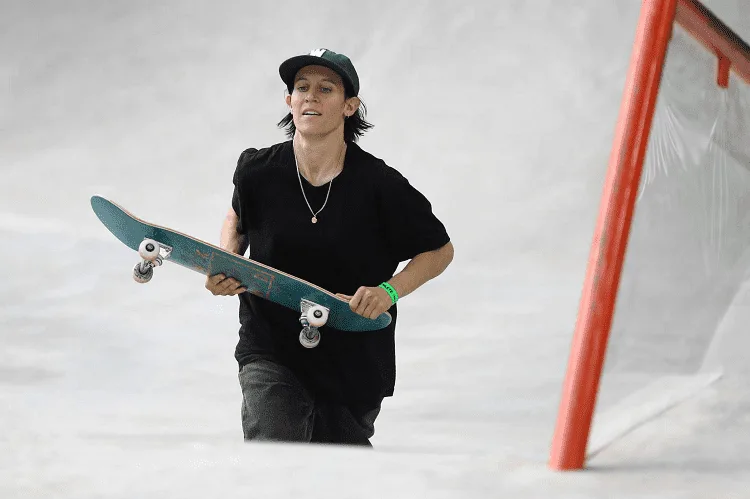
Alexis Sablone is a pro women’s skater than recently competed in the Women’s Street finals at the Olympics in Tokyo. Plus, Sablone has won three golds, two silvers and one bronze at the X-Games. Yet, Sablone managed to do this despite starting at the age of 28.
Perhaps showcasing to any older woman out there that it is never too late to become a member of skating’s elite.
Tony Alva
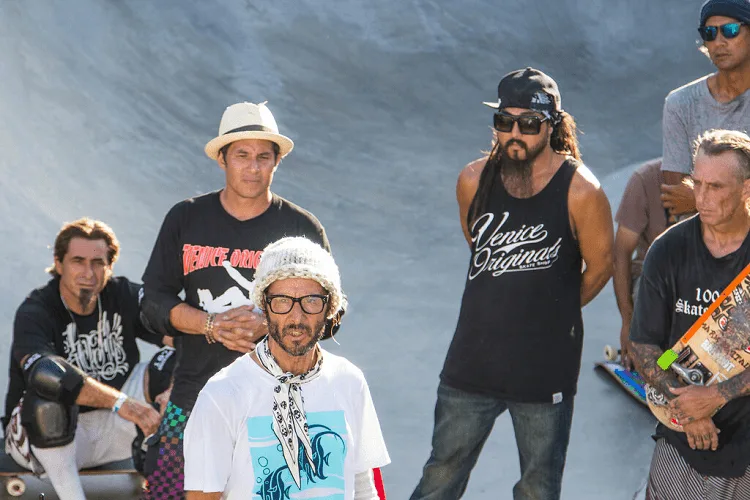
Tony is one of the founding fathers of skating. He was one of the first members of team Zephyr, popularised bowl and vert skating, allowing it to be what it is today and most importantly, he’s still ripping it up.
Tony is the oldest professional skater in the world and has achieved this title at the grand old age of 64, so if you are thirty years old and less than half of his age, you don’t have any excuse.
Tony Hawk
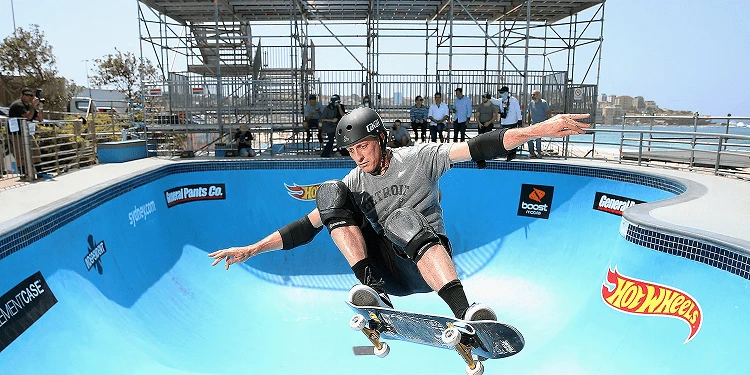
Then, of course, there is the Birdman. Tony Hawk is the man that put skating on the map with his amazing feats on the vert ramp, the famous 900 and his popular video game series boasting his name. Tony has been around for what seems like forever, however, he is still killing it on a vert ramp.
He hit his last ever 900 at the age of 48 and has continued to perform gnarly tricks right up until now at the age of 54. Hawk has already made himself immortal in the world of skating but his dedication to the cause should inspire older skaters to do all they can to shred to the best of their ability.
Then here are some other examples of older skaters that continue to tear it up in the world of skating:
- Steve Caballero
- Jeff Grosso
- Danny Way
- Daewon Song
- Steve Berra
- Chris Roberts
- Jamie Thomas
What Is The Best Entry Level Set Up?
If this guide has swayed you and you are sold on the idea of joining the skating crowd later in life, you’ll need to know what the best gear for starting out is. Picking a board, trucks, wheels and more can be very tricky, especially if you don’t know what you are looking for. So with that in mind, here is a quick beginner setup that will serve you well without breaking the bank:
Best Beginner Deck
It really doesn’t matter what brand you go for, so long as it is a recognised and trusted brand and the board is made from Canadian maple wood. However, there are some things you should consider.
Firstly, while it can be tempting to buy complete decks to save some cash and cut the work down for yourself, you run the risk of getting a shoddy board with less production value. So be sure to buy a deck and components separately.
Then secondly, as an older skater learning the sport for the first time. We would suggest that you go for an 8.25-8.5 deck size. This allows for more stability, more room to land tricks and a much more comfortable learning process. Deck brands that we would suggest would be Alien Workshop, Plan B, Element, Almost, Chocolate, Powell Peralta, Birdhouse and Hop King.
Best Beginner Wheels
This will depend on where you plan to use your board. If you plan to ride in skate parks more, we would suggest soft wheels, as these will run much faster and smoother when on smooth surfaces.
However, if you are planning on street skating, or using your board as a means of commuting, we would suggest hard wheels that will weather the rough terrain with ease and allow you to keep up a steady pace despite the terrain.
However, as for size, we would say that somewhere between 52mm and 54mm would be ideal for a beginner skater.
Some great brands to invest in would be Bones, Spitfire, OJ, Sushi, Minilogo, Element and Slime Balls.
Best Beginner Trucks
While you can afford to be a little more cost-efficient on the above components, trucks are components that are meant to last.
So if you buy cheap, you will get what you pay for. So don’t be afraid to drop more cash on this than any other part. As if you do, these trucks will likely stay with you for years to come. The brands that you can trust are Independent, Thunder, Tensor and Venture.
Other Essentials
Then there are several other things that we would suggest that beginners add to their collection. Here is a list of things that you should get before you start your skating career:
- Elbow pads
- Knee pads
- Wrist guards
- Skate tool
- Risers
- AC7/AC11 Bearings
How Old is Too Old?
Honestly, it depends on what you are skating for. If you plan on getting into skating at thirty with the hope of winning gold in Paris 2024, the simple reality is that it almost definitely won’t happen.
There are 13-year-olds that are better than 99% of us skaters ever will be, so unless you are just about the swiftest learner out there, this may be out of your reach.
However, at thirty, you can still become a competent skater and you might even become good enough to compete in some local or regional competitions, so you can still fulfil that need to compete.
Then as for a more recreational skater, we would say that up until the age of 50, you can still maintain a level of athleticism to skate regularly and do the vast majority of the tricks that are popular today.
However, at some point in all of our lives, our athletic ability will fade, our bodies will slow down and it’s important to listen to your body. So if you simply can’t keep up with the trick list, don’t stress yourself.
In this case, you can still skate but it will be in a more chill fashion. Older skaters can use popsicle boards as a form of travel rather than a means of popping tricks.
Or alternatively, you can ride cruisers and longboards which are much more mellow to get around on. The thing we are trying to get at here, is that there is no age where skating is out of reach. It will depend on what you want to get out of skating and your own personal circumstances.
You’re Only As Old As You Feel
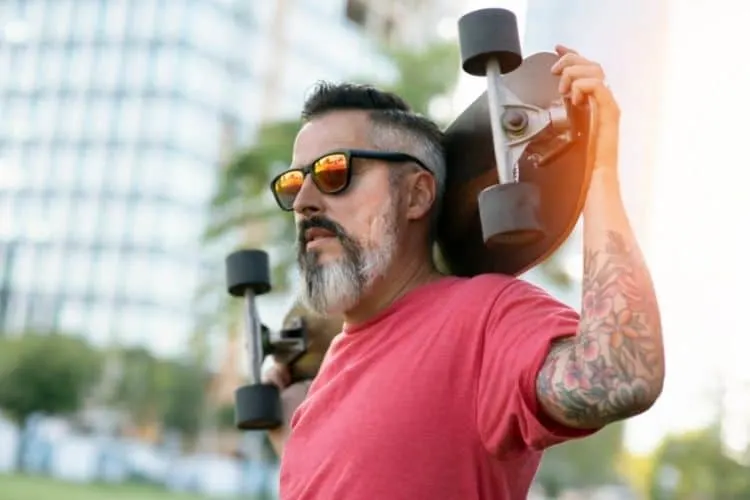
As you can see from the information above, skating doesn’t have any age restrictions and if you feel up to the challenge at thirty, the skate community will be more than accommodating.
We hope that this guide puts your mind at ease, lends a helping hand in getting you started and allows you to get involved in one of the finest sports in the world. Get out there and get ripping!
FAQ Section
If you have reached the end of this article and you still haven’t got the answers that you were looking for, you might appreciate our FAQ section that will give you everything that you need to know. Check it out below:
Answer: Throughout this guide, we hope we have assured you that being an older skater is not only doable, but it’s also a wonderful thing. However, when starting out, you might not know what tricks you should be prioritizing.
So with that in mind, we are going to give you a list of tricks that you should learn so that it will give you a strong foundation to go on to bigger and better tricks. Check them out below:
* Pushing and stopping
* Turning and pivoting
* Kickturns
* Body varials
* Ollies
* FS/BS 180’s
* Shove-its
* Pop-shove-its
* Kickflips
* Heelflips
Answer: The oldest competitor at the X-games 2021 was none other than the legendary Bucky Lasek at 48 years old. The veteran skater competed in the SKB Vert Best Trick category. He not only competed, but he also managed to finish in a very respectable ninth place.
Perhaps showing that age is only a number and if you have the tools to make things happen, then anything is possible. Bucky last won a gold at the X-Games at the age of forty where he would seal 3 golds in the space of a year in Barcelona, Foz do Iguacu and Munich.
If you would have asked this question in 2013, we would have said yes, absolutely. The average age of pros over the decade stretching from 2003-2013 was 23.56. A stat that was higher than the previous decade that played host to an average age of pro which was 21.67.
However, in recent years we have seen an influx of teen skaters coming onto the scene such as Sky Brown, Rayssa Leal and Momiji Nishiya who have brought the average right down. So while there is absolutely a place for older skaters, the average skater is getting even younger.
Final Thoughts
So that is our guide on how to skate in your thirties and beyond. What did you make of this guide? Was this helpful and informative for you? What other skating guides would you like to see from us in the near future? Let us know in the comments section below and as always, thank you for reading.
Looking for more interesting readings? Check out:

